Archive for the ‘Featured’ Category
Tuesday, December 4th, 2012
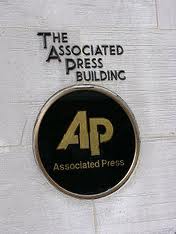 by Carolyn Yeager
by Carolyn Yeager
My latest phone call on the morning of Monday Dec. 3 to the Associated Press office in New York brought the following results: The answerer, upon hearing my name, immediately connected me to Corporate Communications, where I spoke to the same woman I spoke with the previous Monday, Nov. 26. I identified myself and told her I had re-sent the first email from Nov. 8 (rather than the second one from Nov. 14) as she requested but did not receive any acknowledgment of receipt from anyone. She said she forwarded it to the proper parties, but had not guaranteed there would be a reply.
In answer to my persistent questions, to which she finally gave her name as “Lauren,” though she would not give me a last name, she added the information that the email was forwarded to “the journalist and the news editor.” Lauren would not reveal the name of the news editor. She also would not answer whether AP was getting other emails and phone calls about this subject. She said to this, and so many other questions, “I can’t tell you that.” Thus the road forward on this issue is being “stonewalled” by the guilty. As we know, they are able to write and publish tons of prose about the impossible stories of the “survivors” of the “Holocaust,” but go deaf, dumb and blind when it comes to answering simple questions of fact concerning these stories. Let’s take a look at what they are actually guilty of.
 Stonewalling: To refuse to answer or cooperate (esp. in supplying information).
Stonewalling: To refuse to answer or cooperate (esp. in supplying information).
I have asked for further elucidation from reporter Verena Dobnik about her vaguely-worded but pointed reference to seeing a “death camp” tattoo on the left arm of Elie Wiesel during an interview session … that has never been seen by anyone! Yet, not a single further word has come forth from her.
What is the Associated Press
[From Wikipedia] The Associated Press is an American news agency, a cooperative owned by its contributing newspapers, radio and television stations in the United States, which both contribute stories to the AP and use material written by its staff journalists. Many newspapers and broadcasters outside the United States are AP subscribers, paying a fee to use AP material without being contributing members of the cooperative. The AP staff is represented by the Newspaper Guild union, which operates under the Communication Workers union, which operates under the AFL-CIO. The content of AP news stories relating to current political issues that impact union interests has increasingly been subject to claims of news media bias. Pictured at right: AP headquarters at 450 West 33rd Street, New York City and above right: Logo on the former AP Building in New York City
 Journalism Scandals
Journalism Scandals
Journalistic scandals include: plagiarism, fabrication, and omission of information; activities that violate the law, or violate ethical rules; the altering or staging of an event being documented; or making substantial reporting or researching errors with the results leading to libelous or defamatory statements.
All journalistic scandals have the common factor that they call into question the integrity and truthfulness of journalism. These scandals shift public focus and scrutiny onto the media itself. Because credibility is journalism’s main currency, many news agencies and mass media outlets have strict codes of conduct and enforce them, and use several layers of editorial oversight to catch problems before stories are distributed.
However, in some cases, investigations later found that long-established journalistic checks and balances in the newsrooms failed. In some cases, senior editors fail to catch bias, libel, or fabrication inserted into a story by a reporter. In other cases, the checks and balances were omitted in the rush to get an important, ‘breaking’ news story to press (or on air). [Not the case here]
How is fabrication defined
A fabrication is a lie told when someone submits a statement as truth, without knowing for certain whether or not it actually is true [or knowing for certain it is not true]. Although the statement may be possible or plausible, it is not based on fact. Rather, it is something made up, or it is a misrepresentation of the truth. Examples of fabrication: A person giving directions to a tourist when the person doesn’t actually know the directions. Often propaganda is fabrication.
Propaganda
A form of communication that is aimed at influencing the attitude of a community toward some cause or position by presenting only one side of an argument. Propaganda is usually repeated and dispersed over a wide variety of media in order to create the chosen result in audience attitudes.
Lie
To lie is to deliver a false statement to another person(s) [by speaking or writing] which the speaking/writing person knows is not the whole truth, intentionally.
 Does Verena Dobnik’s reporting of seeing a non-existent tattoo on a famous fabricator’s arm amount to a journalism scandal?
Does Verena Dobnik’s reporting of seeing a non-existent tattoo on a famous fabricator’s arm amount to a journalism scandal?
Yes, by all criteria it does. But if no one cares, it will continue to pass unnoticed. One thing people need to keep in mind: If Verena Dobnik really had the experience of seeing Wiesel’s tattoo, as she claims, she would certainly be prepared to come forth and verify it, in the form of some kind of statement. That she doesn’t, and that her news editor and the AP are also “stonewalling” this question, tells us in no uncertain terms that she is guilty.
This website, Elie Wiesel Cons The World, charges Verena Dobnik with committing journalistic fraud, of intentionally lying in her reported interview with Mr. Wiesel about seeing his tattoo … and 2) in like manner her news editor is guilty of allowing her false claim to go past the checks that should have been performed, and 3) the AP is guilty of covering up the crime, rather than investigating it, once it was brought to their attention. 4) Lauren in Corporate Communications is guilty of “following orders” to enable the cover-up to continue. I understand she is “just doing her job” — like all those concentration camp guards that Wiesel and Dobnik like to condemn.
This calls for a lawyer, but …
This would be an excellent case if there were a lawyer that would undertake it. There are a few attorneys who will act as defense counsel in holocaust-related cases, but none who will go on the offense. The simple demand would be, “Show us the tattoo! It’s very easy to defend yourself, so why don’t you?” The silence in the face of that request tells us, by simple deduction, there is no tattoo. Thus we should keep the letters, emails ([email protected]) and phone calls (1-212-621-1500) going, and post these blogs around the Internet and to email contacts. Don’t let the AP off the hook.
Call or twitter these two people directly:
Paul Colford
Director of Media Relations
Twitter: http://twitter.com/PDColford_AP
+1 212.621.1895
Erin Madigan White
Manager of Media Relations
+1 212.621.7005
http://twitter.com/emadiganwhite
10 Comments
Category Featured | Tags: Tags: AFL-CIO, AP Corporate Communications, Associated Press, Elie Wiesel's non-existent tattoo, Erin Madigan White, journalism scandals, journalistic fraud, Paul Colford, stonewalling, Verena Dobnik,
Social Networks: Facebook, Twitter, Google Bookmarks, del.icio.us, StumbleUpon, Digg, Reddit, Posterous.
Friday, November 30th, 2012
By Carolyn Yeager
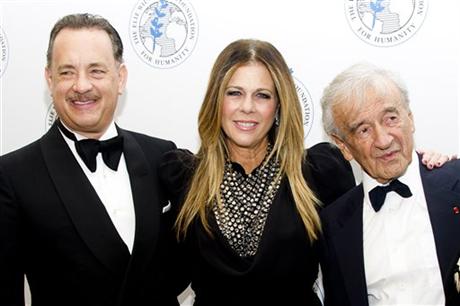 On Oct. 17 in New York, actor Tom Hanks became this year’s honoree of the Elie Wiesel Foundation for Humanity. Honored for what, you ask? Well, it’s a little vague. What is written in the news account is “Hanks’ consistent thoughtfulness and concern with his charitable endeavors.” Doesn’t specify what they are, but I looked it up separately and found Hanks is a supporter of a variety of mainly health, i.e. curing disease symptoms, and environmental causes. He is on the Board of Governers of the National Space Society, which is dedicated to the creation of a spacefaring civilization, and he supports UNICEF.
On Oct. 17 in New York, actor Tom Hanks became this year’s honoree of the Elie Wiesel Foundation for Humanity. Honored for what, you ask? Well, it’s a little vague. What is written in the news account is “Hanks’ consistent thoughtfulness and concern with his charitable endeavors.” Doesn’t specify what they are, but I looked it up separately and found Hanks is a supporter of a variety of mainly health, i.e. curing disease symptoms, and environmental causes. He is on the Board of Governers of the National Space Society, which is dedicated to the creation of a spacefaring civilization, and he supports UNICEF.
At right, Tom Hanks and his wife Rita Wilson with Wiesel at the Elie Wiesel Foundation ‘Arts for Humanity’ Gala in New York City.
Oprah Winfrey was similarly honored in 2007. That ceremony was held at the Waldorf-Astoria in New York City. The ceremony for Tom Hanks took place at the New York Public Library, the difference of location possibly having to do with pre-Madoff and post-Madoff.
However, Hanks’ award is called the Arts for Humanity award, rather than the Humanitarian Award, which doesn’t appear to be given out every year – the last one mentioned was given to Nicholas Sarkozy in 2008 when he was President of France, for his “steadfast support of Israel.” [Of course, later Sarkozy was accused of “racism” for initiating a program of deporting France’s Roma refugee population back to Romania and Bulgaria from whence they came, which must have disappointed Wiesel and his Foundation staff. ] So is Hanks’ award the same or different from the Humanitarian Award? As with everything to do with Wiesel, it can’t be pinned down.
But the question that came up in my one-track mind is: Did Elie pull back his tuxedo jacket sleeve and show the famous actor his vaunted “death camp” tattoo – as a special privilege that he reserves for certain people? Hanks didn’t mention it, so I guess not. There were probably too many people around, anyway. This tattoo-unveiling must take place when no witnesses are present to spoil what is one person’s word against everyone who was not there (i.e. everyone else)!
Only Verena Dobnik, the Associated Press reporter on the NY City beat, has made the claim of seeing the elusive symbol that represents Elie being an inmate at the Auschwitz “Death Camp.”
Verena Dobnik and AP are now hiding from this issue
A reader, Laura Bell, has written in to tell us that Elie Wiesel has stated to “her teacher” that he doesn’t show his tattoo because he doesn’t want to say “Oh, look what the Nazis did to me.” He doesn’t want to give them that satisfaction. So that is the reason eh? Well, that apparently didn’t stop him from showing it to Verena Dobnik on the occasion of her interview with him, or to someone (according to Dobnik) at Buchenwald when he was there with U.S. Pres. Barack Obama in 2009. But Verena Dobnik doesn’t want to talk about this singular honor given her past her first claim that she was given it. My emails to her via the Associated Press go unanswered and my phone calls are not returned, even though I am assured “they will get back to me.” When they find out what I want from them, they simply go into hiding mode.
Between my emails and phone calls, and those of others such as Roger and Brian, we will keep their attention anyway. Brian suggested a registered letter – that is a good idea! I suppose he found a snail mail address. I will call the New York AP office again on Monday and this time I’ll ask for the name of the person to whom I’m speaking. I hope many more of you will do the same. The phone number is 1-212-621-1500; email is [email protected].
The Associated Press has put itself into a bad position by allowing a reporter like Verena Dobnik to include unverified nonsense concerning Elie Wiesel into her news stories. But this particular bit of nonsense is very different from the usual lies about what occurred to any random self-described “holocaust survivor” 70 years ago, or even to Elie Wiesel 70 years ago. This is about right now, and what this woman “saw” on Wiesel’s arm just two months ago, and how it can be verified – because it must be verified. I suggest that Dobnik come forward and answer some questions about what she saw, and the circumstances surrounding it, because we know that Elie Wiesel won’t do so. That’s why we call Elie Wiesel a liar, and now we’re also calling Verena Dobnik a liar … and next will come the Associated Press.
No Comments
Category Featured | Tags: Tags: Arts for Humanity Award, Associated Press, Auschwitz Tattoo, Elie Wiesel Foundation for Humanity, Tom Hanks, Verena Dobnik,
Social Networks: Facebook, Twitter, Google Bookmarks, del.icio.us, StumbleUpon, Digg, Reddit, Posterous.
Tuesday, November 20th, 2012
By Carolyn Yeager
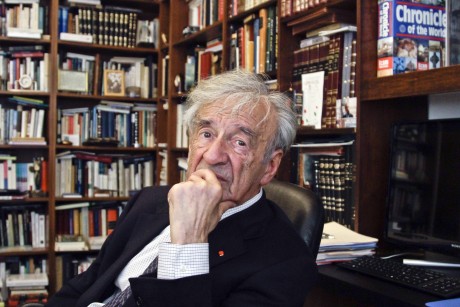 Elie Wiesel photographed in his New York Office on Sept. 12, 2012, by AP photographer Bebeto Matthews. Notice how well covered his left arm is … how does he ” pull back his left jacket sleeve” to reveal his tattoo to reporter Verena Dobnik?
Elie Wiesel photographed in his New York Office on Sept. 12, 2012, by AP photographer Bebeto Matthews. Notice how well covered his left arm is … how does he ” pull back his left jacket sleeve” to reveal his tattoo to reporter Verena Dobnik?
* * *
Repeated attempts to get a response from Associated Press reporter Verena Dobnik, or any Associated Press representative, about Dobnik’s questionable Oct. 8 news story that she saw a tattoo on Elie Wiesel’s arm have failed to bring forth any response. (See prior blog post dated Nov. 7: “False report that Elie Wiesel showed reporter “his tattoo?“)
Telephone calls to the New York office of the Associated Press (212-621-1500), where Dobnik is assigned, along with two emails to the address the AP gives out for “feedback and comments” ([email protected]), which they say they welcome, have not been answered.
A pleasant young man in the Dallas office of the AP, whom I talked to some days ago, assured me that comments about stories are relayed to the reporter who wrote them. I believe that is probably true so I put the fault on Verena Dobnik. I just now called and reached another voice mail at the New York office, but this time it belongs to a man in the communications department, so perhaps I will hear back from him.
On November 14, I sent the following email to [email protected]
To: Associated Press and Verena Dobnik
Re: Verena Dobnik, New York based AP reporter and her article of Oct. 8, 2012, “Elie Wiesel survives Bernie Madoff, heart by-pass”
The Associated Press New York office is responsible for allowing a blatant example of journalistic fraud to go unchallenged. Ms. Dobnik writes in her story:
He pulls back his left jacket sleeve to reveal a Nazi death camp number tattooed on his forearm as he sits comfortably in his Manhattan office for an interview.
“Usually I don’t show it,” he says.
This either never happened or should not be included because:
-
We are not told what Dobnik actually saw. Does she know what a “Nazi death camp number” looks like? This is too vague a “description” for a professional reporter to use.
-
There is no such thing as a “Nazi death camp number” … only numbers allegedly tattooed on prisoners at Auschwitz. This reveals the propagandistic nature of the reporter’s intent. (I will not spend time belaboring the facts that there can be no purpose in tattooing prisoners in a “death camp”, and that Elie Wiesel was never scheduled for death.)
-
Elie Wiesel has NEVER shown a tattoo on his arm to any camera, even though there is a long history of questions stating doubts that he actually has one and challenging him to show it to the public. A cameraman (Bebeto Matthews) may have accompanied Ms. Dobnik on that occasion to Wiesel’s NY office and took some photos – Wiesel is seen wearing a heavy suit and long sleeved dress shirt in photos taken on Sept. 12, making it hardly possible for him to just “pull back his sleeve” to reveal a tattoo on his forearm. He would have had to unbutton his shirt cuff and roll it back, an unlikely gesture as Wiesel is not known to have done it for any other reporter.
-
Without a corroborating witness or a photo taken of Wiesel actually baring his arm with a tattoo present on it, there is no reason to believe the reporter’s casual interjection of this event.
Further, because of the controversy about Elie Wiesel’s “tattoo” it is natural to suspect this was added by Dobnik to her article to try to give some credence to Wiesel’s claim that he has a tattoo even though no one has ever seen it. The Associated Press is thus being USED by Dobnik to disseminate lies in order to further what is false propaganda about “the Holocaust” in general and Elie Wiesel in particular. The Associated Press needs to take this very seriously by questioning Verena Dobnik about this interview.
Dobnik followed up with this sentence in her article:
One of the exceptions was a 2009 visit to the Buchenwald death camp Wiesel survived, with President Barack Obama and German Chancellor Angela Merkel.
This is equally questionable. In the first place, it is very vague – it actually makes no sense, but the reader is left with the impression that Wiesel told Dobnik that he showed his tattoo to these two world leaders at that time. However, there is NO statement from Wiesel himself that he showed a tattoo to Obama and Merkel in 2009 at Buchenwald. Also none from Obama or Merkel. This absolutely smacks of fabrication on the part of the reporter to make her interview more interesting, and maybe more important and noticeable. However, NO OTHER PUBLICATIONS or writers picked up on this astounding news that Wiesel had made this gesture to two world leaders at Buchenwald! Why not? Because it is not corroborated and no doubt could not be corroborated.
Also, Dobnik is stating falsely that Buchenwald was a “death camp.” It has been admitted for many years by official Holocaust historiography that Buchenwald was not a so-called death camp, and that there were no “death camps” in Germany. According to the official version of the Holocaust, there were only five “extermination camps,” all in Poland.
Verena Dobnik is guilty of (1) interjecting false propaganda into her reports for the purpose of misinforming and inciting hatred against Germany in the minds of her readers. If she is ignorant about the facts of the Holocaust, the editors at the Associated Press should not be. But worse, she is guilty of (2) LYING about what took place during her interview with Elie Wiesel.
I am serious as a heart-attack about this blatant case of journalistic fraud carried out under the nose of the Associated Press, and approved by you. I demand that you reply to this email within a few days time and give me whatever explanation you have. If you find that my complaint has legs, you need to issue a public retraction and an apology. I intend to pursue this issue vigorously.
Very truly yours,
Carolyn Yeager
Wednesday, November 7th, 2012
by Carolyn Yeager
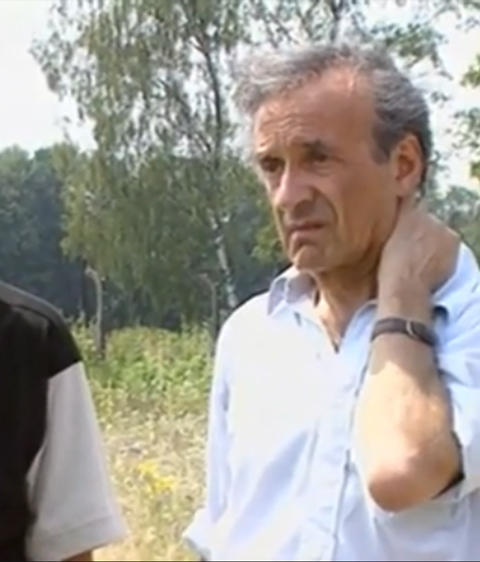 Associated Press reporter Verena Dobnik may be guilty of intentional mis-represention in an AP story published Oct. 8, 2012 in which she said she saw a tattoo on Elie Wiesel’s left forearm.
Associated Press reporter Verena Dobnik may be guilty of intentional mis-represention in an AP story published Oct. 8, 2012 in which she said she saw a tattoo on Elie Wiesel’s left forearm.
The story was carried by many news outlets, including the Washington Times, Seattle Times, Huffington Post, Salon.com, the Bend Bulletin (Oregon), The Sun Chronicle, Flagstaff Today, Deseret News , Yahoo news, The Times of Israel (and other specifically Jewish news media).
No date for the actual sit-down interview is given in the report, which is titled “Elie Wiesel survives Madoff wipeout, heart by-pass,” and was contributed to by another Associated Press writer, Randy Herschaft. This is not the first time Dobnik and Herschaft have worked together. In the news story, Dobnik, who was born in Slovenia and lives in New York, claims to have seen Wiesel’s tattoo but does not describe what she saw. She writes:
He pulls back his left jacket sleeve to reveal a Nazi death camp number tattooed on his forearm as he sits comfortably in his Manhattan office for an interview.
“Usually, I don’t show it,” he says.
One of the exceptions was a 2009 visit to the Buchenwald death camp Wiesel survived, with President Barack Obama and German Chancellor Angela Merkel.
Was this extraordinary claim checked out for accuracy by the Associated Press before running the story? In all of his 62 years in public life (since 1950) Wiesel has never exhibted publicly a tattoo on his left arm. Furthermore, there are some photographs taken over the course of the years in which his bare left arm can be clearly seen (sometimes in bright sunlight, as in the unretouched photo here taken from Wiesel’s own film about a return visit to Auschwitz) and none show any kind of mark on his arm, let alone anything that resembles an Auschwitz concentration camp number.
Where’s the excitement?
Dobnik’s claim is so surprising that it should have garnered excitement from the mainstream media, but just the opposite happened – it was totally ignored and some publications that had originally published the story may have removed it from their online news sites! For this reason, I doubt that this incident ever actually happened; I think it very likely that Verena Dobnik added it to her interview simply because she wanted to. I can’t give her motivations, which may be quite complex. But this part of her interview should have set off a red light for the AP editors, and some questions should have been asked. Not just the seven I list below, but also why she should mention it at all if no photograph proving what she says she saw accompanies the article? I do not, at this point, speculate that Wiesel drew something on his arm and then gave Dobnik a quick glance at it. It seems far more likely to me that Dobnik, as other journalists have done, just added it to her story on her own. I have to add that Wiesel’s handlers and publicity team have not killed the story – so he doesn’t disapprove of it.
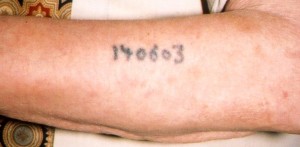 A challenge to Wiesel, Dobnik and the AP
A challenge to Wiesel, Dobnik and the AP
(At left is a detail of a photograph of the left arm of Auschwitz survivor Sam Rosenzweig.) If Wiesel is willing to show his tattoo to the reporter Dobnik, why won’t he show it to the general public and end the questions and swirling speculation about “does he or doesn’t he” have what he says he has? This kind of tease from Ms. Dobnik cannot go unanswered, especially from Elie Wiesel Cons The World where we have been asking this question for two and one-half years – since July 2010 – without ever being shown even a picture of Wiesel’s alleged tattoo. I therefore do not believe this reporter’s story and accuse her of journalistic fraud. She and Mr. Herschaft are clearly biased reporters who favor, and even specialize in, the traditional ‘holocaust’ narrative. I will register this complaint in a formal way with the Associated Press and I urge you readers to do the same. Don’t sit back and expect others to work miracles on your behalf – take action. The more the Associated Press hears about this, the better.
Contact info for the Associated Press: Call AP headquarters at 212.621.1500 or email [email protected] for general inquiries. Here is a List of AP news bureaus and correspondents. AP says they welcome feedback and comments from readers. Send an email to [email protected] and it will be forwarded to the appropriate editor or reporter. Remove any attachments, including email signatures, company logos and disclaimers, to ensure that we receive it. (Don’t attach this article, or even link to it, for best results. It should not appear to be an organized campaign from this website.)
Some questions we can fairly ask of Ms. Dobnik and the AP editors are:
- Does she know what a “Nazi death camp number” looks like? She apparently doesn’t know that Auschwitz was the only German concentration camp that tattooed prisoners, so there is no such thing as a “death camp number,” only an Auschwitz camp number.
- Can she describe what this number tattooed on Wiesel’s arm looked like? And why didn’t she? Did she get a long enough or close enough look at it to be sure of what she “saw?”
- Why would the Nazis tattoo prisoners in a “death camp” who were presumably scheduled for death? If they were not all scheduled for death, why call it a “death camp number?”
- Why does she and the AP continue to call Auschwitz a “death camp” when so many survived, along with their tattoos?
- How does she know that Wiesel showed his tattoo to President Obama and Chancellor Merkel in 2009 during a visit to Buchenwald? The implication is that she had to learn it from him, during the interview, but she doesn’t include this in her report so we don’t know.
- Buchenwald is not listed as one of the supposed “death camps” (they are all outside of Germany proper), so why is Dobnik allowed to call Buchenwald a “death camp.”
- How many other mistakes has this AP reporter made in her dire ignorance of what she is writing about?
9 Comments
Category Featured | Tags: Tags: Associated Press, Auschwitz, death camp, Elie Wiesel, Randy Herschaft, Verena Dobnik,
Social Networks: Facebook, Twitter, Google Bookmarks, del.icio.us, StumbleUpon, Digg, Reddit, Posterous.
Thursday, September 27th, 2012
This article is courtesy of Jett Rucker and Smith’s Report, where it appears in the current issue.
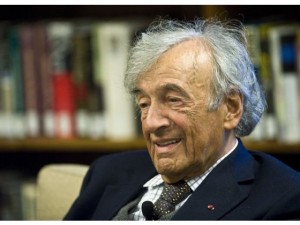 Since Elie Wiesel is “the world’s most famous Holocaust survivor,” I asked Mr. Rucker if I could post his article here. It does an effective job of putting the term “holocaust survivor” into a more realistic context – one that includes all “survivors.” I have added the sub-headings and pictures, and done very slight editing (removing some phrases in parentheses) for ease of reading.
Since Elie Wiesel is “the world’s most famous Holocaust survivor,” I asked Mr. Rucker if I could post his article here. It does an effective job of putting the term “holocaust survivor” into a more realistic context – one that includes all “survivors.” I have added the sub-headings and pictures, and done very slight editing (removing some phrases in parentheses) for ease of reading.
Of course, my position remains that it is doubtful Elie Wiesel was in the camps at all. Thus, his “survivor guilt” might be even greater than if he were, and survived. Can that explain his lifelong campaign on behalf of keeping “Memory” alive of what occurred, both fictitious and real? Some might think so, but perhaps a better explanation is plain old opportunism. The many favors and privileges Wiesel has obtained throughout his lifetime are based on his “survivorship;” keep that in mind as you read the following.~cy [Image: Ye olde survivor Elie Wiesel has lived the good life, as his contented face reveals.]
Survivor Guilt
by Jett Rucker
“Survivor guilt” has come into popular usage as an irrational complex on the part of people who are among a very small number of people who, by sheer happenstance, have emerged alive from a disaster that took the lives of many others who seem to have deserved no more (or less) to have survived than they (the survivors) did. Occasionally, for example, a plane crash occurs from which one, or perhaps two, victims emerge relatively unscathed, while all their fellows perished in the catastrophe. The complex plagues them for years after the event, in some cases.
Now and then, though, some sort of more-genuine guilt may seem to attach to the fact of survivorship, as in the case of the (surviving) members of a Uruguayan rugby team who committed (and admitted to) cannibalism in the process of surviving two months on a remote peak in the Andes where their plane had crashed in 1972. The surviving cannibals were absolved of their “sin” by the Pope, whom both the perpetrators and, presumably, the victims acknowledged as their spiritual shepherd.
A stronger presumption of actual guilt on the part of survivors might attach, say, to adult male survivors of the Titanic sinking in 1912, as they might be suspected of having violated or otherwise evaded the famous stricture supposedly invoked at the time, “Women and children first.” Some male passengers apparently did that, while others are thought to have boarded life boats that were about to depart the sinking vessel with empty seats in them.
The dead have not been heard from …
And then, there are those long-term situations imposed by a hostile group of others, in which a potential for treachery, betrayal, collaboration, or even fouler play might enter the picture. In the annals of human conflict, undoubtedly war provides the greatest number of these situations, especially if they are rated by numbers of either: (a) dead victims, who cannot testify as to what occurred; or (b) survivors, who perforce provide the only narratives available as to what occurred. Be it noted: neither group, not individually nor collectively, is in a position to even understand all of what did happen, quite aside from what might have happened had anyone acted differently from the way they did.
War veterans are no doubt the most-numerous of the groups that fit the description above, including both those who survived and those who, not surviving, never gained the exalted status of veterans. I often wonder how the glories of past victories (and defeats) might be perhaps somewhat dimmed if the voices of the dead might be heard on the occasions when the glories are celebrated among the survivors and their putative beneficiaries.
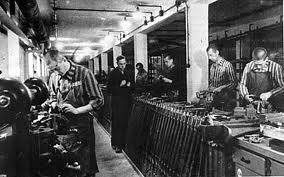 War Industry Workers: “survivors” or veterans?
War Industry Workers: “survivors” or veterans?
A very special, if demographically dwindling, group remains in our midst who command, and lately often claim, reverence that is not accorded even to veterans of this (or other) nation’s wars. These are those who claim to have been forced by the National Socialist regime that governed Germany from 1933 to 1945 to leave their homes and properties in Germany for resettlement or labor camps to the east of Germany because they were Jews, as well as those Jews resident in countries east of Germany who were dragooned into service in Germany’s war-industry plants such as those in Birkenau, Dora-Mittelbau, and over a thousand other locations: “Holocaust survivors,” as they style themselves.
Such persons (the genuine ones among the many claiming such status with no basis whatsoever in truth) are survivors, if at all, only in the sense that anyone residing in Germany or Austria by the time World War II reached its catastrophic end was a survivor. What they survived was not forced labor (to which many were indeed subjected), but the blanket devastation wreaked by Allied bombers upon the domiciles of the entire populace of their “targets.” Insofar as their survival involved their conscription into forced labor in war-industry factories, such fortunates may as well be designated “veterans” as their less-fortunate predecessors were conscripted to go to the front, there to confront the irresistible onslaught of Soviet manpower and American productivity.
Be all this as it may, all an elderly Jew in America with any sort of claim to European origins need do to command instant respect and credulity among those around him or her, is to invoke the sacred appellation, “Holocaust Survivor.” Once this is done, silence reigns all around, and rapt attention is reflexively granted by all those in attendance, they all having long since been conditioned to render such obeisances upon hearing the Pavlovian Bell.
Jewess Anna Breslaw questions the innocence of “Holocaust survivors”
 An intrepid, if possibly naïve, American Jewess of unwonted analytic disposition, Anna Breslaw, writing for the Tablet, ventured the irrefutable speculation that some of the few genuine “Holocaust survivors” among those many claiming the vaunted status might, indeed, have survived the parlous times they undoubtedly went through, by way of guile, or even treachery, in a few cases.* She did not trouble her argument with particulars as to how her co-religionists might have collaborated, contrived, betrayed, or otherwise arranged for themselves the favored treatment that enabled them to “survive,” but the force of her argument was sufficient to rouse into action none other than that Centurion of the Sanctity of the Holocaust Mythology, Jeffrey Goldberg of the Atlantic Magazine. He styled Breslaw’s impeccable logic as “ghastly.”
An intrepid, if possibly naïve, American Jewess of unwonted analytic disposition, Anna Breslaw, writing for the Tablet, ventured the irrefutable speculation that some of the few genuine “Holocaust survivors” among those many claiming the vaunted status might, indeed, have survived the parlous times they undoubtedly went through, by way of guile, or even treachery, in a few cases.* She did not trouble her argument with particulars as to how her co-religionists might have collaborated, contrived, betrayed, or otherwise arranged for themselves the favored treatment that enabled them to “survive,” but the force of her argument was sufficient to rouse into action none other than that Centurion of the Sanctity of the Holocaust Mythology, Jeffrey Goldberg of the Atlantic Magazine. He styled Breslaw’s impeccable logic as “ghastly.”
Goldberg advanced the view of what he hopes might still be the dominant view of Jewish and Jewish-conditioned readers of his widely circulated platform. Maybe it is, and maybe the Tablet has got the ear (mind, heart) of thoughtful readers of both (or all) publications. Goldberg’s time-worn imprecations bear inspection, as do Breslaw’s rather more-nuanced comments, made, be it noted, in a context rather remote from the ones implied in Goldberg’s tirade.
Can real “Holocaust survivors” really be innocent?
Breslaw’s well-considered cautions arrive on the American scene at a critical time when real “Holocaust Survivors” have faded from the scene that they never had the temerity to dominate in the first place, but self-qualified “survivors” have taken their place to affect shock and affront at such “disparagements” as Breslaw offers. Real “Holocaust survivors,” keenly aware from genuine experience what moral ambiguity attends the status to which they could lay claim, have always remained reticent in proclaiming the particulars of their experiences, and acts. Those many who lack this experience, but claim it by implication, let on as though they were blameless both in terms of their incarceration in the first place, but further—and this is the stretch—as to their deportment while actually incarcerated.
The act can be pulled off only by those quite innocent of the genuine experience. Those who affect utter innocence in the fates they claim may be dismissed as being innocent not only of guilt, but also of the experiences they claim to have.
As for Goldberg, and his magazine, we may consign them to a category reserved for those liars who propose to benefit from the success that may be enjoyed by still other liars.
*Of particular interest to us is this passage by Breslaw:
… in grade school I received the de rigueur exposure to the horror—visiting geriatric men and women with numbers tattooed on their arms, completing assigned reading like The Diary of Anne Frank and Night. But the more information I received, the less sympathy the survivors elicited from me. Each time we clapped for the old Hungarian lady who spoke about Dachau, each time Elie Wiesel threw another anonymous anecdote of betrayal onto a page, I eyed it askance, thinking What did you do that you’re not talking about? I had the gut instinct that these were villains masquerading as victims who, solely by virtue of surviving (very likely by any means necessary), felt that they had earned the right to be heroes, their basic, animal self-interest dressed up with glorified phrases like “triumph of the human spirit.”

2 Comments
Category Featured | Tags: Tags: "Holocaust survivors", Anna Breslaw, Elie Wiesel, Jeffrey Goldberg, Tablet Magazine,
Social Networks: Facebook, Twitter, Google Bookmarks, del.icio.us, StumbleUpon, Digg, Reddit, Posterous.
Sunday, August 5th, 2012
By furtherglory
(First published at Scrapbookpages Blog on August 2, 2012)
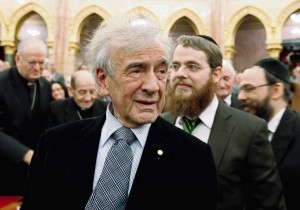 Yesterday the online Chicago Tribune had an article which reported that “In recognition of [Elie] Wiesel’s vast contributions to the art of the printed word, which includes more than 50 works of fiction and nonfiction, he has been named winner of the 2012 Chicago Tribune Literary Prize.”
Yesterday the online Chicago Tribune had an article which reported that “In recognition of [Elie] Wiesel’s vast contributions to the art of the printed word, which includes more than 50 works of fiction and nonfiction, he has been named winner of the 2012 Chicago Tribune Literary Prize.”
[Photo of Wiesel at left is from December 2009 in Budapest, Hungary. ]
After reading this article, I immediately checked out Carolyn Yeager’s website Elie Wiesel Cons the World to see what she has to say about this new honor for Elie Wiesel. I found a video which explains the whole story of Elie Wiesel in great detail. The video starts out with the sound of an old fashioned typewriter as the keys hit the paper, typing out the URL of the website. I love it!
The sound of the typewriter keys brought back a flood of memories; I was alive during World War II and I saw the news reels of the liberation of Bergen-Belsen and read about the liberation of Dachau. Yet I didn’t get interested in the Holocaust until many years later. My lack of interest in the Holocaust was nothing unusual, as the video on Yeager’s website points out.
The article in the Chicago Tribune also points out that there was very little interest in the Holocaust as late as 1960 when Elie Wiesel’s book Night was first published in English.
This quote is from the Chicago Tribune:
After the war, [Elie Wiesel] worked as a journalist in France for Yiddish and French publications. The noted French writer and Nobel laureate Francois Mauriac urged Wiesel to write his Holocaust memoir, and Mauriac “went from one publisher to another,” said Wiesel, to persuade them to take on Wiesel’s book.
At first, “Night” generated little interest, and the English-language publication in 1960 “sold 5,000 copies in three years,” Wiesel said. “And the same thing, by the way, in France — everywhere.”
Why was the world slow to recognize the book’s value?
“Maybe it needed — the world itself needed maybe a whole generation for readers to realize that they must know something more” about the Holocaust, Wiesel said.
As a person who was alive and well between 1945 and 1960, I can tell you why no one was interested in the Holocaust during that period. The years after World War II were the best of times. During the 1950s, everyone was extremely happy to be living during peace time; no one wanted to re-live the war. I was writing and selling magazine articles during the 1950s, but not stories about the Nazi concentration camps, which would not have been of interest to very many people at that time. There were thousands of Holocaust survivors in American during those years, but they were keeping their mouths shut and hiding their tattoos.
I lived in Germany for two years after World War II, but I didn’t bother to go to see the former Dachau camp. When I went back to Germany for the first time in 1995, I didn’t go to see the Dachau Memorial Site. The Holocaust did not become as popular as it is now until many years later. If only I had anticipated the Holocaust mania, I could have written a novel about Auschwitz and Buchenwald and become a millionaire. Many people have urged me to write a fake Holocaust memoir, but I think it is too late for me; there are too many fake memoirs on the market.
I was one of the first to put the information on the Internet that Elie Wiesel could not have been in the famous photo taken in Barrack 56 in Buchenwald on April 16, 1945 because, by his own account as written in his book Night, he was in the camp hospital on that date. You can read that page on my website, which I updated 3 years ago, here.
1 Comment
Category Featured | Tags: Tags: Chicago Tribune, Elie Wiesel, Night, Scrapbookpages Blog,
Social Networks: Facebook, Twitter, Google Bookmarks, del.icio.us, StumbleUpon, Digg, Reddit, Posterous.
Tuesday, June 19th, 2012
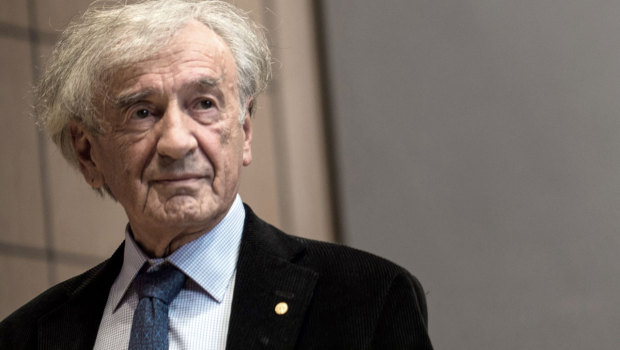
Elie Wiesel in 2012
By Carolyn Yeager (edited on June 21st)
Elie Wiesel is making news again by repudiating a Hungarian Government award he received in 2004. By this gesture, he apparently hopes to intimidate independent nation-states to take into consideration Jewish Power – Holocaust-Power – in every decision they make. Wiesel also likes to gain public attention for what he alleges to be the crimes of the Nazis and their collaborators.
The award Wiesel is returning (or is he? I cannot confirm that) is the Republic of Hungary’s Order of Merit, Grand Cross presented to him by president Ferenc Madl in 2004. Let’s hope he never gets it back.
Wiesel said last week that he was “outraged” that Hungarian House Speaker Laszlo Kover participated, together with Hungarian Secretary of State for Culture Geza Szocs and far-right Jobbik party leader Gabor Vona, in a re-burial ceremony in Romania honoring author Jozsef Nyiro, who was a member of the Arrow Cross Parliament during the 1930′s.
“It’s just too close to home,” Wiesel told an Associated Press interviewer. In a letter to Kover, he wrote “It is with profound dismay and indignation that I learned of your participation” with Szocs and Vona in a ceremony honoring “a fascist ideologue of the Horthy and Szalasi regimes”.
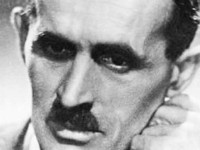
Background on Nyiro
From The failed reburial of József Nyirő in Transylvania, May 30, 2012 in the Buda Post:
József Nyirő was a Catholic priest who became a writer after Transylvania was annexed to Romania in 1920. His works, according to the government’s new draft curricula, should in future be taught in Hungarian high schools. In 1941, after the re-annexation of Transylvania to Hungary, Nyirő became a Member of Parliament in Hungary and as such went into exile in 1945. He died in Spain in 1953, and his last wish was to be buried in his homeland. At the initiative of the Hungarian Civic Party (MPP), a small Hungarian ethnic party in Transylvania, the Office of the Hungarian Parliament initiated his reburial. The new Romanian government, however, regards Nyirő as a Hungarian irredentist writer. Nyirő’s reburial, which was scheduled for Sunday (28 May) was cancelled after the Romanian authorities withdrew permission, claiming that the document carried the wrong registration number. Romanian PM Victor Ponta called the reburial a provocation.
A commemoration event was held instead of the reburial. What Elie Wiesel objects to is that three Hungarian officials attended the commemoration. Wiesel wants all-out condemnation of anyone and everyone who is painted as a “far right National-Socialist, fascist or antisemite.”
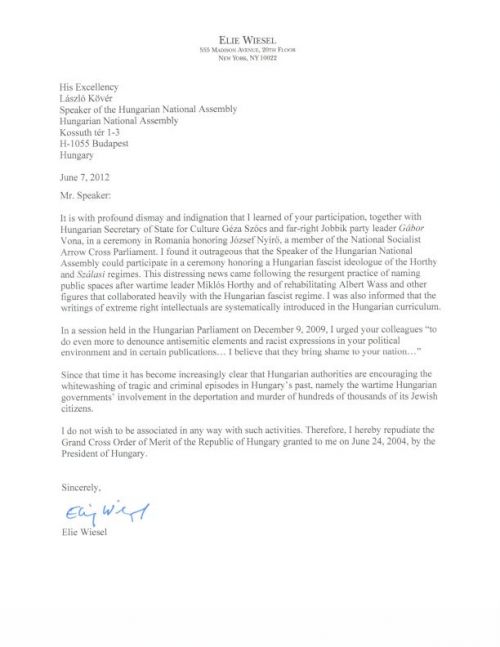
Here is the letter that Wiesel wrote to the Speaker of the Hungarian National Assembly. Sorry it is such poor quality. He writes in paragraph two that in 2009 he urged members of the National Assembly “to do even more to denounce antisemitic elements and racist expressions in your political environment and in certain publications … I believe they bring shame to your nation.”
He writes that since that time it has become worse, that Hungarian authorities are “whitewashing” Hungary’s criminal past.
Finally, “I do not wish to be associated in any way with such activities. Therefore, I hereby repudiate the Grand Cross Order of Merit … given to me on June 24, 2004 by the President of Hungary. He doesn’t say he is returning it, does he. But it is so reminiscent of his statements that he does not want to be in the same room with a “holocaust denier.” He clearly feels he’s being contaminated by those whose views are opposite to his.
And there is the famous Wiesel signature which doesn’t resemble at all the signature on the U.S. Military Questionaire signed by Lázár Wiesel in 1945. It was I who first thought to compare the signatures and brought it to light in September 2010.
Much ado about what?
Jewish insanity is behind the dis-allowance of a man’s cremated remains to be buried in the land in which he was born, and which he loved. Josef Nyiro was born in Hungarian-populated Transylvania, just as Elie Wiesel was. After it was given to Romania in 1920, it remained majority Hungarian. After 1945, Transylvania was handed back over to Romania, but is still populated by mostly Hungarians. Josef Nyiro was of Hungarian ethnicity; Elie Wiesel is of Jewish ethnicity … neither Hungarian nor Romanian. Yet Elie Wiesel would surely have been in favor of not allowing Josef Nyiro’s remains to be buried in his own (and only) homeland (where Elie Wiesel does not want to be buried — he may want to be buried in Israel), while he definitely wants to prevent Hungarian nationals from honoring this man.
Does Elie Wiesel, the Jew whose own spiritual homeland is Israel, want to determine for Hungarians and Romanians what they can and cannot do in their homelands? Yes. Does this make any sense? Only to someone like Elie Wiesel.
17 Comments
Category Featured | Tags: Tags: Elie Wiesel, Josef Nyiro, Laszlo Kover, Republic of Hungary Order of Merit, Romania,
Social Networks: Facebook, Twitter, Google Bookmarks, del.icio.us, StumbleUpon, Digg, Reddit, Posterous.
Saturday, June 9th, 2012
10 Comments
Category Featured | Tags: Tags: Carolyn Yeager, Elie Wiesel, Elie Wiesel Cons The World,
Social Networks: Facebook, Twitter, Google Bookmarks, del.icio.us, StumbleUpon, Digg, Reddit, Posterous.
Thursday, May 31st, 2012
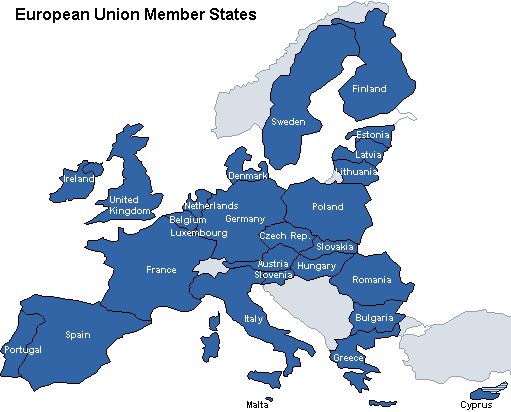 Europe (above) should be wide open to all comers, according to Elie Wiesel, EGAM (European Grassroots Antiracist Movement) and SOS-Racisme.org.
Europe (above) should be wide open to all comers, according to Elie Wiesel, EGAM (European Grassroots Antiracist Movement) and SOS-Racisme.org.
By Carolyn Yeager
(last edited on June 1st)
Elie Wiesel wants you to sign a petition that proclaims “We are all Greek Jews. ” It in essence will mean that you approve that Greek voters (and voters in every other European nation) must comply with the wishes of the Jewish community in their nation when it comes to their political choices. This is such insanity that the world media are not even carrying the story. The Guardian was chosen to publish the petition as a news story, but it has not spread very far.
Elie Wiesel, however, is one of the original signatories, lending whatever prestige he may still possess to the misbegotten venture. The other signers are mostly Jewish, with a possible smattering of water-carriers and communists. The sponsors include two antiracist organizations: EGAM and SOS Racisme. What do they want? They want to destroy Europe as a white homeland. Can anyone really think this is a good idea?
Voice of conscience
Organized Jewry presents itself as the voice of conscience of the world. This has long been a favored method of control and, though there is no basis for it, many white European peoples, because of the constant media barrage portraying Jews as “wise and carriers of the West’s oldest religion,” seem to fall for it. The Jew-controlled mass media is the new “Holy Scripture” that gives us our modern morality of Tolerance as the highest virture and Equality as the highest law.
The main intention of Elie Wiesel and the other signatories is to enforce “The Holocaust” as the world’s religion for the goyim … as they term all non-Jews. For the same reasons they seek to make the world accept Jerusalem as the supreme seat of international justice, from whence the final decisions on all matters—for which there will be no appeal—will flow. We are to view the world through Jewish eyes and only through Jewish eyes. The very first paragraph of the petition tells us this.
The neo-Nazi party Golden Dawn entered the Greek parliament this month. With its swastika-inspired emblem, Hitlerian salute, reference to Mein Kampf, antisemitic and racist ideology, Holocaust denial, violence against migrants, threats against journalists and personality cult, the party is the lineal heir of the German national-socialist party that led Europe and the world into chaos and bloodshed.
Who else but Jews would write this? But it is incorrect — it was not the German National-Socialist party that led Europe and the world into chaos and bloodshed. It was in actuality World Jewry! The petition then goes on to add Latvia, Austria, and Hungary to Greece for the crime of “Third Reich nostalgia,” simply because a segment of their populations voted for anti-immigration parties considered to be on the “right.” Finally, it accuses Geert Wilders Freedom Party in The Netherlands of promoting “race inequality” because it is against so many Muslims in the country changing the culture from Dutch to middle-eastern.
The petition signatories hate nationalism and favor regional unions (like the EU) and an over-arching world government because they think they have a better chance of manipulating the latter to their purposes. They use the word “terrifying” to describe trends toward nationalism, implying that Greek Jews (a tiny minority in Greece who make far more noise than their numbers warrant) are in danger of extermination!
We refuse to accept that on our continent, Jewish, immigrant, Muslim, Roma or black people might fear for their lives because of who they are. We invite all citizens, political parties, unions, civil society, intellectuals and artists to fight the extreme right by promoting and bringing to life the European dream. We must always remember that this dream was built on the ruins of Nazism. We must never forget about the Shoah. Our dream is of a continent free from racism and antisemitism. It is the project of a society based on “togetherness” – beyond boundaries.
Incredible assumptions. Their continent? Europe is not the Jews’ homeland, nor is it the homeland of Muslim, Roma or black people. It is the homeland of white Caucasian, Indo-Aryan people. It is these white Caucasian people who are now fearing for their lives! Europe does have boundaries, and those boundaries are important. It is clear that these signatories, which include Elie Wiesel, want to exert their own very un-European ideas on Europe. When Europeans begin to resist this alien takeover and the imposition of the “Holocaust” religion, these Jews naturally get very nervous. They over-react, as they’re doing now.
Recommended Dogmas
They go so far as to propose two shockingly blatant “dogmas” for Europeans — as if the World International Court in Jerusalem were already a reality.
- Refute austerity (a slam at Germany), because it puts the bankers (Jewish capitalism) out of their profits from eternally increasing debt (a ponzi scheme).
- Refute the anti-immigration “lockdown” of Europe’s frontiers, because the social welfare system requires constant immigration to sustain itself.
They insist on democracy, social justice and the promotion of equality. They mean by this that blacks, gypsies (who are not indigenous to Europe but came from India), Asians, Arabs and Jews must be considered equal to the national population simply by putting their feet on that national soil. They must be given social equality, meaning special financial and other assistance that will afford them a comparable lifestyle to the working native population. In this way, the illusion can be created that everyone is equal. See Germans to Learn Turkish … instead of Turks learning German, for the shape of things to come if Elie Wiesel has his way.
Why not “We are all Palestinians now”
One naturally has the thought: Why aren’t these Jewish petitioners compiling something to send to Israel titled “We are all Palestinians now.” Why isn’t equality desirable in Israel? The inequality in Palestine under Jewish rule is far, far, far worse than anything found in Europe. Ditto the anti-immigration feeling. What we have here is the same old hypocrisy that Elie Wiesel has been exhibiting his entire life.
These petition signers know that forced equality is unnatural and will weaken, even sicken, the host population. So for them, Europe belongs to everyone. But Israel belongs to the Jews.
Don’t sign the petition, and in fact mock and ridicule anyone who does. They deserve it.
15 Comments
Category Featured | Tags: Tags: Elie Wiesel, Europe, Greek Jews, New Dawn Party,
Social Networks: Facebook, Twitter, Google Bookmarks, del.icio.us, StumbleUpon, Digg, Reddit, Posterous.
Saturday, May 19th, 2012
by Carolyn Yeager
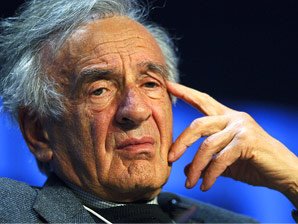
To cry or not to cry, that is the question.
Elie Wiesel, as usual, cannot make up his mind.
On May 6, he gave a major speech (for big bucks) at Xavier University in Cincinnati, brought there by the Center for Holocaust and Humanity Education. A reporter who covered the speech wrote that Wiesel said this:
Wiesel recounted his rescue from the concentration camp by the U.S. Army and said he remains grateful.
“We cried,” he recalled. “We discovered for the first time that we could cry.”
But in an interview that was published on the following day, May 7, on NBC New York, Wiesel said the opposite to reporter Gabe Pressman:
He told me about the day the American army came to liberate the prisoners,
How the prisoners “wanted to cry but they didn’t know how to cry… if you cry, you will never stop so they didn’t even do that.”
So which is it? Did they cry or didn’t they? It seems you get to choose which version you like best.
I pointed out in this article on the Xavier speech that this was the first time I had ever heard or read Elie Wiesel say that he or his barracks-mates cried. Since this Blog takes the position that Wiesel was not even there (in Buchenwald), it’s kind of a mute point–except for the fact that it’s one more reason not to believe he was there. He can’t keep his “story” about it straight.
Wiesel embellished his Buchenwald liberation tale when he was interviewed by Oprah Winfrey, too. As I recounted in this article, he told Oprah in Nov. 2000 that the first thing the religious boys in his barracks did was to “reassemble” and offer prayers for the dead–yet in his books he made a point to say the only thing anyone did was go after the food provisions. He wrote that they had no thought of their families nor of friends, only of food.
The flexibility of memory
Considering all this, we arrive at a crucial question about the Holocaust. The fate of nations may hang on it! What does it mean if Memory, that sacred human ability on which the entire holocaust narrative rests, cannot be depended upon?
Elie Wiesel’s memory is clearly not reliable. Yet he himself has made everything depend on memory. He wrote: “I shall never forget that night, the first night in camp […] never shall I forget those moments … ” and so on. But he must have forgotten some things since his story doesn’t remain consistent.
Memory itself–the act of remembrance–is just not what Elie Wiesel makes it out to be. For Weisel, it’s more like these words he is famous for saying: Some things are true though they didn’t happen, while others are not, even if they did. That is how we tend to remember!
In his case, Elie Wiesel was liberated from Buchenwald, even if he wasn’t … and it’s not true that the prisoners were only interested in food, even if they were. Memory–it’s such a flexible thing.
17 Comments
Category Featured | Tags: Tags: Buchenwald liberation, Elie Wiesel, Holocaust fraud, memory, Oprah Winfrey,
Social Networks: Facebook, Twitter, Google Bookmarks, del.icio.us, StumbleUpon, Digg, Reddit, Posterous.
 Stonewalling: To refuse to answer or cooperate (esp. in supplying information).
Stonewalling: To refuse to answer or cooperate (esp. in supplying information). Does Verena Dobnik’s reporting of seeing a non-existent tattoo on a famous fabricator’s arm amount to a journalism scandal?
Does Verena Dobnik’s reporting of seeing a non-existent tattoo on a famous fabricator’s arm amount to a journalism scandal? 
















